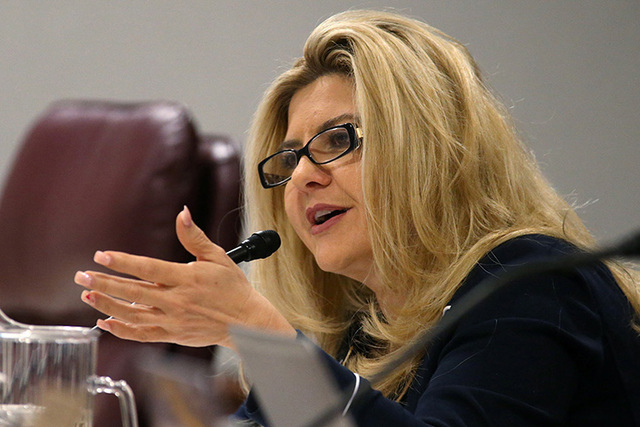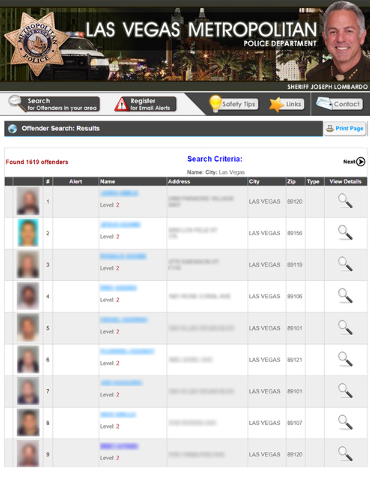Bill would repeal Adam Walsh sex-offender act in Nevada
After years of languishing in Nevada courts, legislators are reconsidering sex-offender laws affecting juveniles and the way criminals are ranked and registered.
State Sen. Richard “Tick” Segerblom, D-Las Vegas, and Assemblywoman Michele Fiore, R-Las Vegas, introduced Senate Bill 99 in February to repeal the state’s version of the federal Adam Walsh Act. Critics have said the law disenfranchises juveniles who could be reformed, and many think the way the law categorizes offenders — based on the crimes committed rather than risk of re-offending — might not really serve the public interest.
The law has been challenged in Clark County courts, the 9th Circuit Court of Appeals and the Nevada Supreme Court, which placed an emergency injunction against the law in October, the day before it was supposed to finally be enacted.
The Nevada Legislature passed Assembly Bill 579 in 2007 to make the state compliant with the Walsh Act, signed into law by President George W. Bush in 2006. The law was named after Adam Walsh, the 6-year-old son of TV personality John Walsh, who was abducted and murdered in Hollywood, Fla., on July 27, 1981.
Las Vegas attorney Maggie McLetchie has been litigating the issue since 2008. She said the Legislature was wrong to think that the federal government could compel Nevada to follow its guidelines.
McLetchie was scheduled to challenge the law in the state’s high court in early February, but oral arguments were canceled to give the Legislature another chance to work on it.
SEXUAL DELINQUENTS
One problem with the Walsh Act is that community notification and lifetime registration applies to youths convicted of sex crimes as long as they’re over 14. But opponents of the law say juveniles should be treated differently than adult offenders.
Las Vegas attorney Donna Coleman has been serving on a committee evaluating the Walsh Act for the state attorney general’s office. She said she would testify in favor of the bill to repeal it.
The fragile minds of juveniles might not be able to cope with the pressures of community notification and appearing in online sex offender registries, Coleman said.
“We are at a very high suicide rate for juveniles,” she said. “We don’t want to push them over the edge.”
A 2014 study by the Illinois Juvenile Justice Commission found that most juveniles convicted of a sexual offense were not motivated by “deviant sexual arousal or a focused intent to harm others,” which would indicate a risk of future sexual offenses. Youths usually commit sexual crimes due to developmental or social issues, or because they were abused themselves.
Most juveniles respond well to therapy, the report said, so they will not become adult sex offenders.
The proposed law would ensure that juveniles would not be subjected to community notification, though schools would continue to get the information. When youths reach age 21, a court hearing would assess whether they were a risk to the public, Coleman said.
Juveniles who commit particularly heinous sexual crimes likely would be tried as an adult and thus be subjected to adult registration rules, she added.
Sgt. Brian Zana with the Nevada Division of Parole and Probation’s sex offender unit compared publishing youth offenders on the public register to branding them with a “Scarlet Letter.” He said the division supports the idea of holding hearings when a juvenile offender turns 21.
“You have to remember children make mistakes,” he said.
Treatment of juvenile sex offenders was addressed in the first Walsh Act case to reach the Nevada Supreme Court. Justices upheld a lower court ruling that said the law did not violate the state constitution. But in an opinion penned by Justice Michael L. Douglas, the court acknowledges problems with the law.
“We share the juvenile court’s concerns regarding the wisdom of this legislation. Nevertheless, we are bound to follow the law,” the opinion reads. “Of utmost concern, it does not appear from the legislative history that the Nevada Legislature ever considered the impact of this bill on juveniles or public safety.”
Another problem is that the statute applies to offenders retroactively, and some people could end up on Internet sex offender registries for crimes that happened as long ago as 1956. In a worst-case scenario, the law could even be applied to people convicted long ago under Nevada’s voided and unconstitutional criminalization of consensual homosexual acts, McLetchie said. SB 99 would not repeal that, too.
RATING RISKS
The old sex offender law was pretty simple: Offenders individually were rated by specially trained mental health professionals from low to high according to their risk of re-offending. But how long people have to register as sex offenders is not based on this risk rating under the Walsh Act.
The current law categorizes offenders into tiers based on the crime they committed and might not truly be in the public’s interest, according to a 2012 multi-state study sponsored by the National Institute of Justice. Researchers found that many with the highest risk of re-offending often ended up on lower tiers with shorter registration terms under the Walsh Act.
“It’s not that cut and dry,” Zana said of categorizing offenders based on convictions.
Many first-time offenders automatically would be rated on the lowest tier under the Walsh Act but would be ranked higher if considered individually based on their risk of re-offending. This includes crimes such as lewdness with a child under 14 and incest, he said.
Under Walsh Act standards, the lowest registration tier is assigned to those convicted of a crime against a child or a sexual crime. Offenders have to register for 15 years.
Tier II offenders committed a sexual crime or one involving a child if it is punishable by imprisonment for more than a year. Those who re-offend after being assigned Tier I graduate to this level and have to register for 25 years. Tier II crimes include felony luring of a child, sexual abuse against children, sex trafficking and child pornography.
Those in the highest tier, which applies to people convicted of crimes including kidnapping and sexual abuse against a minor under 13, must register for life. Top-level crimes also include sexual assaults and murders involving rape.
All of the tiers also include attempts or conspiracies to commit those crimes and similar convictions from other states.
The Legislature said during the 2008 special session that more than 2,000 parolees would move from a low-risk rating under the old law to the highest tier under the Walsh Act.
“You get a needle-in-the-haystack problem,” McLetchie said.
Zana said he has been studying the proposed repeal for a couple weeks, and that while it’s not perfect, he said it’s heading in the right direction.
He said the current law is confusing and a handful of sexual offenses aren’t included, such as peeping and taking secret “up-skirt” photos. “Those are entry-level sex offenses,” Zana said.
Like so-called gateway drugs, Zana said people committing these offenses often get bored and move on to worse crimes.
Nevada was one of the first states to pass the Walsh Act, Segerblom said, adding that the Legislature rushed to comply with federal guidelines out of fear of losing criminal justice grants.
But the cost to implement it — estimated at $4 million in 2009 — far exceeds the less than $200,000 Nevada would have lost. To Segerblom’s knowledge, the state never has received federal funds to help with implementation of the Walsh Act.
LIFETIME MONITORING
Assemblyman Phillip O’Neill, R-Carson City, requested a separate bill draft to change laws about the lifetime monitoring of offenders and the system for dealing with violations. For the proposed changes, O’Neill has been working with the Nevada Department of Parole and Probation, which has been trying to change lifetime registration laws for years with no success.
The complexity of the legislation is one reason it hasn’t gained momentum in the past, according to parole department Lt. David Helgerman. Many hesitate because on the surface the bill seems to remove lifetime supervision altogether, but Helgerman said the department is actually trying to replace it with an extended probation period.
“We would not recommend something we thought would be a detriment to public safety,” Helgerman said.
Currently, lifetime registration begins for sex offenders after they have finished parole. And to punish violations would require an offender to be charged with an additional felony in the jurisdiction in which they were first charged. If they have moved to another city, officers must scramble to meet the 72-hour deadline to get the violator to court, where they could then be released on bail.
“There’s a long list of problems,” he said about the law.
O’Neill’s bill would replace lifetime registration by extending the maximum probation terms and giving courts more deference in sentencing sex offenders. Rather than new charges, violators would face a parole hearing. The proposed changes also would make it easier to hold hearings for violators in other jurisdictions and would make it easier to transfer probationers and parolees out of state, Helgerman said.
Helgerman said the majority of the sex crimes an ex-convict would have to register for come with life sentences in prison, so lifetime supervision requirements are “redundant.” The four charges that don’t carry maximum sentences of life in prison right now — battery to commit sexual assault, child pornography, incest and exploiting people with mental illnesses — would all get extended prison sentences under the new bill.
O’Neill’s bill also would prevent sex offenders from being released on bail after violating the terms of their registration.
Helgerman said the state has 783 offenders on lifetime supervision.
“This bill would give our current law more teeth,” Helgerman said.
LEGISLATIVE SOLUTIONS
Segerblom said that the current law unnecessarily “lumps everyone together” and burdens local law enforcement agencies. Nine years after the federal Walsh Act passed, most states have rejected it. Only 17 states have enacted it, and the count might include other states, like Nevada, where the law was approved but not fully enforced because of lawsuits.
“We had a really good sex offender law before the Adam Walsh Act,” Segerblom said. “Sometimes you just need to say, ‘I’m sorry.’ A bad law is a bad law.”
SB 99 addresses some of what opponents point to as the Walsh Act’s problems. The current draft of the bill gives offenders a way to appeal tier designations and lifetime monitoring after 15 years, and it calls for individual assessments of juveniles based on their risk of reoffending. The bill also would give juvenile courts the ability to exempt youths from community notification and registration.
The state attorney general’s office has defended the Walsh Act through every legal challenge, and Attorney General Adam Laxalt plans to continue to do so. When asked if Laxalt would support efforts to repeal the Walsh Act, Assistant Attorney General Brett Kandt said there’s no reason for the attorney general’s office to change course “unless and until the Legislature says so.”
Kandt said that he hasn’t seen any studies about problems with the Walsh Act, and the attorney general only engages with the Legislature on bills that would affect public safety, which he did earlier this session. Laxalt’s office sent a memo in January urging lawmakers to support Assembly Bill 45, which would allow the Department of Corrections to give sex offenders risk ratings of moderate-low and moderate-high in addition to low, moderate and high.
This risk ratings system would have no effect on the length of time an offender has to register under Walsh Act standards.
Gov. Brian Sandoval’s office did not return repeated calls to ask whether he would sign a bill to repeal Nevada’s version of the Walsh Act.
Contact Wesley Juhl at wjuhl@reviewjournal.com and 702-383-0391. Follow @WesJuhl on Twitter.

RELATED STORIES
2015 could be year of the gun at Nevada Legislature
Tony Dane doesn’t have many fans
Can Democrats compromise to get schools built?
Nevada construction defect reform bill sent to governor
New assemblyman’s campaign expenses reveal a lot
Nevada lawmakers urged to OK aviation tax abatements
Hambrick recall backers announce replacement candidate
6 legislative committees to watch in 2015
Five (other) big issues for the 2015 Nevada Legislature
5 people to watch in the 2015 legislative session
See all of our coverage: 2015 Nevada Legislature.



















